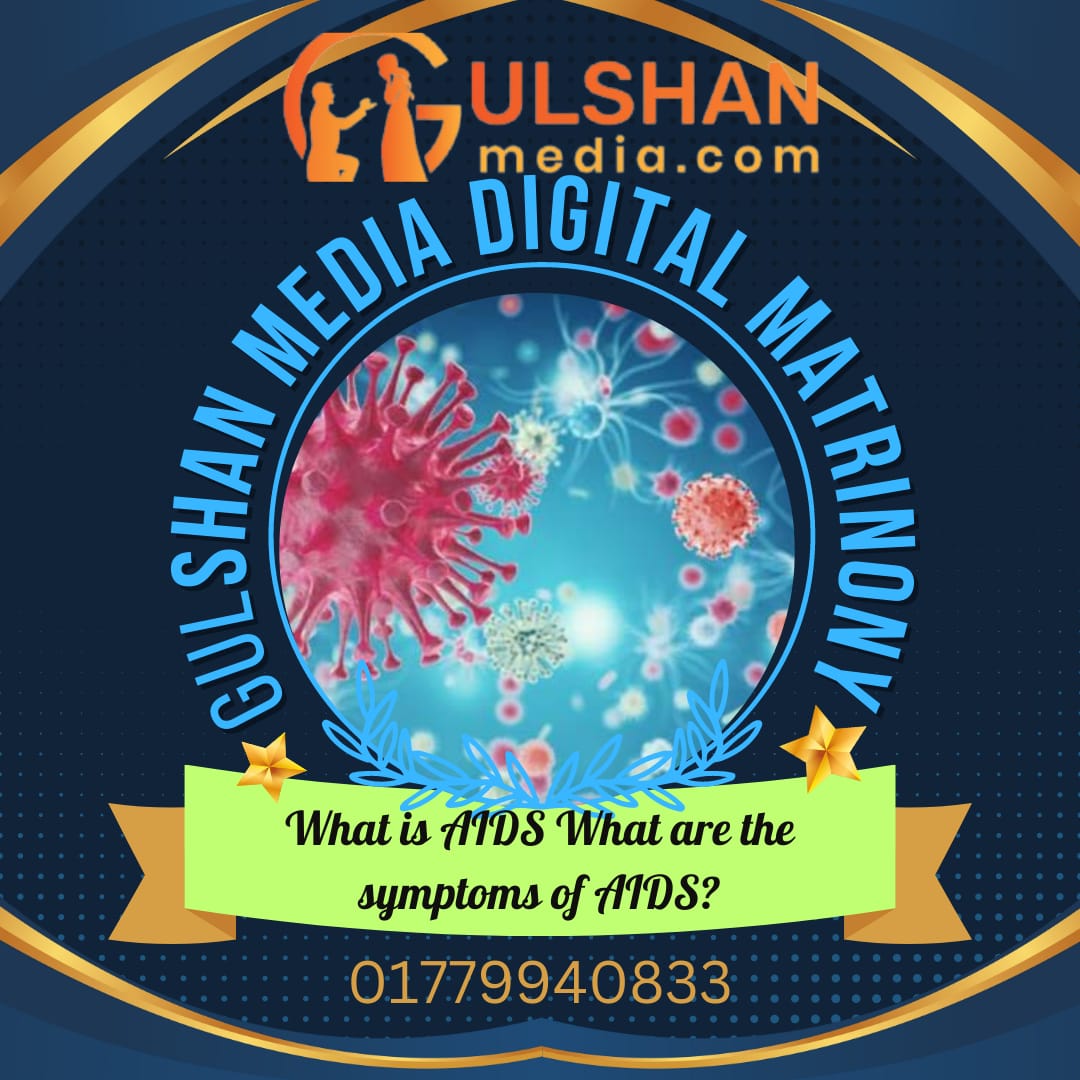What is AIDS? What are the symptoms of AIDS?
What is AIDS? What are the symptoms of AIDS?
Introduction
Acquired Immunodeficiency Syndrome (AIDS) is a complex medical condition caused by the Human Immunodeficiency Virus (HIV). This condition affects the immune system, weakening it and making individuals vulnerable to various infections and diseases. In this article, we will delve into the details of AIDS, exploring its symptoms, progression, and available management strategies.
- HIV and the Development of AIDS HIV is primarily transmitted through unprotected sexual intercourse, sharing contaminated needles, and from mother to child during pregnancy, childbirth, or breastfeeding. Once HIV enters the body, it targets and attacks specific immune cells called CD4+ T cells, gradually depleting their numbers. As the virus replicates, it damages the immune system, leading to the development of AIDS.
- Early Symptoms of HIV :After the initial infection, some individuals may experience flu-like symptoms known as acute retroviral syndrome (ARS). These symptoms may include fever, fatigue, sore throat, swollen lymph nodes, rash, and muscle aches. However, these symptoms are not exclusive to HIV and can often be mistaken for other common illnesses.
III. Progression to AIDS :If HIV infection is left untreated, it progresses through different stages. As the immune system weakens, the virus continues to replicate and destroy CD4+ T cells. The progression to AIDS is characterized by a severe decline in CD4+ T cell count, usually falling below 200 cells per cubic millimeter of blood. At this stage, individuals become highly susceptible to opportunistic infections, which are infections that typically do not cause illness in people with healthy immune systems.
- Symptoms and Complications of AIDS :The symptoms of AIDS vary depending on the opportunistic infections or diseases a person develops. Common symptoms include persistent fever, night sweats, unexplained weight loss, chronic diarrhea, persistent cough, shortness of breath, and recurrent infections. Some of the common opportunistic infections associated with AIDS include tuberculosis (TB), Pneumocystis pneumonia (PCP), Candidiasis (thrush), and Kaposi’s sarcoma.
- Management and Prevention of AIDS : While there is currently no cure for AIDS, medical advancements have made significant progress in managing the condition. Antiretroviral therapy (ART) is the primary treatment for HIV/AIDS. ART involves a combination of medications that target different stages of the HIV life cycle, reducing the viral load in the body and preserving immune function. Adherence to ART can effectively slow the progression of HIV and prevent the development of AIDS.
Prevention remains crucial in combating the spread of HIV/AIDS. It involves practicing safe sex by using condoms, avoiding sharing needles, and getting tested regularly, especially for individuals at higher risk. Additionally, measures such as pre-exposure prophylaxis (PrEP) and post-exposure prophylaxis (PEP) can reduce the risk of acquiring HIV in specific situations.
Conclusion :
AIDS is a serious medical condition caused by HIV, resulting in the progressive weakening of the immune system. Early symptoms of HIV infection can often be mistaken for other common illnesses, making it important to undergo HIV testing regularly, especially for high-risk individuals. While AIDS cannot be cured, treatment with antiretroviral therapy can significantly slow down the progression of the disease and improve the quality of life for those living with HIV/AIDS. Continued efforts in education, prevention, and access to treatment are essential to combat the spread of HIV/AIDS and ensure better health outcomes for affected individuals worldwide.
What to do if someone in the family has AIDS?
Introduction ;
Discovering that a family member has been diagnosed with Acquired Immunodeficiency Syndrome (AIDS) can be overwhelming and emotionally challenging. However, it is essential to remember that with proper support and care, individuals living with AIDS can lead fulfilling lives. In this article, we will explore what you can do if someone in your family has AIDS, providing guidance on emotional support, medical assistance, and lifestyle adjustments to ensure their well-being.
- Educate Yourself about AIDS :The first step in supporting a family member with AIDS is to educate yourself about the condition. Understand the basics of HIV transmission, the progression of the disease, available treatment options, and how it affects the immune system. This knowledge will help dispel any misconceptions and empower you to provide informed support.
- Provide Emotional Support : A diagnosis of AIDS can be emotionally distressing for both the individual and their family members. It is crucial to create an open and non-judgmental environment where your loved one feels safe to express their emotions. Offer a listening ear, validate their feelings, and encourage open communication. Seek professional counseling or support groups to help cope with the emotional impact of the diagnosis.
III. Encourage Regular Medical Care :Regular medical care is vital for managing AIDS. Support your family member in seeking ongoing medical attention from healthcare professionals experienced in treating HIV/AIDS. Help them keep track of appointments, medications, and treatment plans. Encourage adherence to antiretroviral therapy (ART) as prescribed by their healthcare provider, as consistent medication use can significantly improve their health outcomes and quality of life.
- Promote a Healthy Lifestyle : A healthy lifestyle plays a crucial role in supporting individuals with AIDS. Encourage your family member to adopt habits that strengthen their immune system, such as maintaining a nutritious diet, getting regular exercise, and getting sufficient rest. Emphasize the importance of avoiding harmful substances, including tobacco, alcohol, and illicit drugs, as they can further weaken the immune system and interact negatively with antiretroviral medications.
- Foster a Supportive Environment : Create a supportive and inclusive environment within the family and the community. Encourage family members and friends to be understanding and compassionate. Help debunk myths and misconceptions about HIV/AIDS to reduce stigma and discrimination. Provide a safe space for your loved one to discuss their fears, concerns, and aspirations. Engage in activities that promote a sense of normalcy and belonging.
- Address Practical Needs :Assist your family member with AIDS in addressing practical needs that may arise. This includes helping them navigate the healthcare system, accessing financial resources for medical expenses, and connecting them with support services available in the community. Collaborate with healthcare providers, social workers, and AIDS service organizations to identify available resources, including assistance with housing, transportation, and legal matters.
VII. Take Care of Yourself : Supporting a family member with AIDS can be emotionally and physically demanding. It is crucial to prioritize self-care to avoid burnout. Seek support from friends, family, or support groups for caregivers. Maintain a healthy work-life balance and engage in activities that help you relax and recharge. Remember, taking care of yourself allows you to provide better support to your loved one.
Conclusion :
When a family member has AIDS, offering support and understanding can make a significant difference in their well-being and quality of life. By educating yourself, providing emotional support, encouraging regular medical care, promoting a healthy lifestyle, fostering a supportive environment, addressing practical needs, and practicing self-care, you can help your loved one navigate the challenges of living with AIDS. Remember, your unwavering support can contribute to their resilience, empowerment, and overall health, creating a positive and nurturing environment for everyone involved.
“বিয়ে সংক্রান্ত যেকোনো তথ্য ,সেবা এবং পরামর্শ পেতে যোগাযোগ করুন গুলশান মিডিয়ার সাথে। ” কল করুন:01779940833
Email : gulshanmedia2@gmail.com









